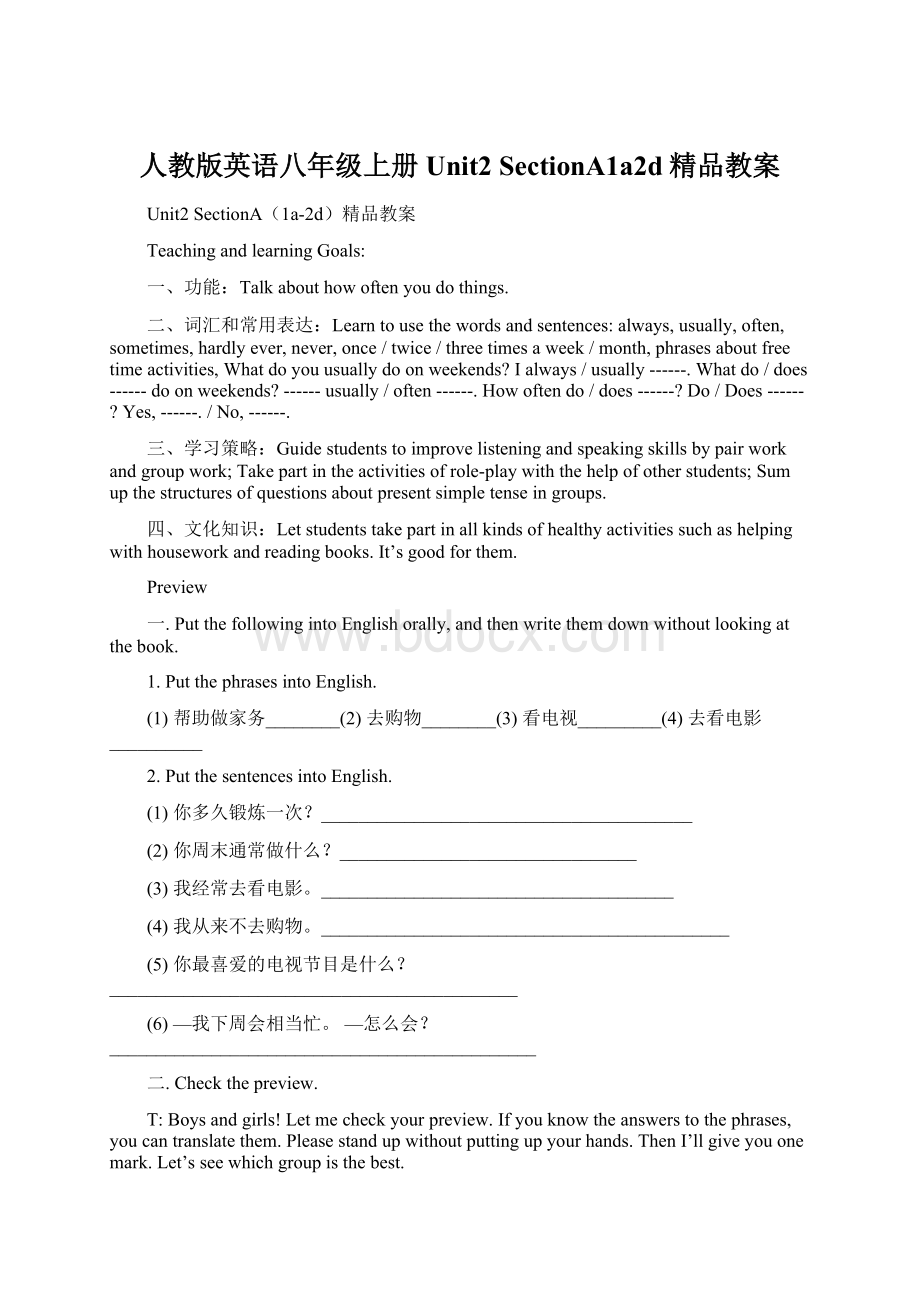人教版英语八年级上册Unit2 SectionA1a2d精品教案.docx
《人教版英语八年级上册Unit2 SectionA1a2d精品教案.docx》由会员分享,可在线阅读,更多相关《人教版英语八年级上册Unit2 SectionA1a2d精品教案.docx(13页珍藏版)》请在冰豆网上搜索。

人教版英语八年级上册Unit2SectionA1a2d精品教案
Unit2SectionA(1a-2d)精品教案
TeachingandlearningGoals:
一、功能:
Talkabouthowoftenyoudothings.
二、词汇和常用表达:
Learntousethewordsandsentences:
always,usually,often,sometimes,hardlyever,never,once/twice/threetimesaweek/month,phrasesaboutfreetimeactivities,Whatdoyouusuallydoonweekends?
Ialways/usually------.Whatdo/does------doonweekends?
------usually/often------.Howoftendo/does------?
Do/Does------?
Yes,------./No,------.
三、学习策略:
Guidestudentstoimprovelisteningandspeakingskillsbypairworkandgroupwork;Takepartintheactivitiesofrole-playwiththehelpofotherstudents;Sumupthestructuresofquestionsaboutpresentsimpletenseingroups.
四、文化知识:
Letstudentstakepartinallkindsofhealthyactivitiessuchashelpingwithhouseworkandreadingbooks.It’sgoodforthem.
Preview
一.PutthefollowingintoEnglishorally,andthenwritethemdownwithoutlookingatthebook.
1.PutthephrasesintoEnglish.
(1)帮助做家务________
(2)去购物________(3)看电视_________(4)去看电影__________
2.PutthesentencesintoEnglish.
(1)你多久锻炼一次?
________________________________________
(2)你周末通常做什么?
________________________________
(3)我经常去看电影。
______________________________________
(4)我从来不去购物。
____________________________________________
(5)你最喜爱的电视节目是什么?
____________________________________________
(6)—我下周会相当忙。
—怎么会?
______________________________________________
二.Checkthepreview.
T:
Boysandgirls!
Letmecheckyourpreview.Ifyouknowtheanswerstothephrases,youcantranslatethem.Pleasestandupwithoutputtingupyourhands.ThenI’llgiveyouonemark.Let’sseewhichgroupisthebest.
(设计意图:
教师可以更有针对性地教,学生可以更有针对性的学。
)
Warmupandleadin
T:
Boysandgirls!
Onweekends,Ioftendosomehouseworkandsometimestoshopping.Whatdoyoudoonweekendsandhowoftendoyoudoit?
S1:
Ialways------andoften------.
S2:
Iusually------andsometimes------.
S3:
------
Whenthestudentsanswerthequestionstheteacheraskastudentstofillinthechartaccordingtothestudents’answersontheblackboard.
Names
Activities
Howoften
S1
S2
S3
------
(设计意图:
引导学生列出一些常见的周末活动并让别的学生在黑板上进行板书,激活了学生的思维图式,而且也引出了谈论不同活动频率时所要使用的频度副词,紧扣本课话题。
)
T:
Icanseeyouallhavearelaxingweekend.Pleaselookatthepictureonpage9.Itshowsmanyweekendactivities.Whataretheweekendactivities?
S4:
helpwithhousework,reading------
S5:
exercise,watchTV------
S6:
gotothemovies,goshopping------
T:
Let’slisttheweekendactivitiestogether.
Ss:
helpwithhousework,------
T:
OK.Youallarewonderful!
Now,let’scometo1a.Lookatthepictureandmakealistoftheweekendactivities.
(设计意图:
引导学生先单独说出课本插图中的活动,再集体说出插图中的活动,最后完成1a的活动列表。
这种先说后写的过程可以给基础较差的学生创造更多模仿他人的机会。
)
Goonaskingstudentssomequestionsaftercheckingtheanswers.
T:
Boysandgirls!
Doyouliketheweekendactivitiesinthepicture?
Ss:
Yes.
T:
Howoftendoyouhelpwithhousework?
S7:
I------helpwithhousework.
T:
HowoftendoesS7helpwithhousework?
S8:
He/She------helpwithhousework.
T:
Whatdoyouusuallydoonweekends?
S9:
Iusually------
T:
Doyougoshopping?
S10:
Yes,------./No,-----
T:
WhatdoesS10usuallydoonweekends?
S11:
He/Sheusually------.
------
Ifthestudentcan’tanswerthequestions,letotherstudentsgivesomehelp.Ifallstudentscan’tanswerthequestions,theteachergivessomehelp.
(设计意图:
根据现实生活中的真实情况与学生进行对话,从而引出目标语言Whatdoyouusuallydoonweekends?
Whatdoeshe/shedoonweekends?
Doyougoshopping?
Howoftendoyou------?
Howoftendoeshe/she------?
学生易于理解接受。
)
ListeningPracticeI
While-listeningactivities
1.Listenforthegeneralideaof1b.
T:
Boysandgirls!
Pleaselookatthepicturein1aandguesswhatthestudentsaretalkingabout.
S1:
weekendactivities.
S2:
healthylifestyle
------
T:
OK,pleaselistentotherecordingandfindoutthemainidea.
Thegeneralideaoftheconversationisabout .
A.howtospendweekends
B.thefrequencyoftheweekendactivities
C.healthylifestyle
2.Listeningforthespecificideasof1b.
(1)Askstudentstoreadthefrequencywordsin1b.
(2)Explainthefrequencywordstostudents.
always(100%)>usually(80%)>often(30-50%)>sometimes(20%)>hardlyever(5%)>never(0%)
(设计意图:
让学生能够熟读频度副词并学习它们的具体用法,为顺利完成下面的听力练习降低了难度。
)
T:
Class,weallknowtheconversationisaboutthefrequencyoftheweekendactivities.Whataretheseweekendactivities?
Now,listenforthespecificideas.
(3)Askstudentstolistenandwritetheactivitiesnexttothecorrectfrequencywords.
___exercise____________
______________________
______________________
______________________
______________________
______________________
(4)T:
Class,gothroughtheblanksplease.Thenlistenandcompletetheconversationaccordingtothetape.
Reporter:
Whatdoyou________doonweekends?
Girl1:
I_________goshopping.
Boy1:
I_______goshopping.I________watchTV.
Boy2:
I________exercise.
Girl2:
I______helpwithhousework.
Reporter:
Howaboutyou?
Girl3:
I_________watchTV.I________read.
Reporter:
Oh,whyisthat?
Girl3:
Oh,Idon’tknow.IguessIjustlikebooks.
注:
在听之前,一定让学生快速的把听力填空浏览一遍,并且给予听力策略的指导——即注意听力材料中的周末活动和频度副词。
Post-listeningactivities
1.Listentothetapeandrepeat.Thenreadandrecitetheconversationsindividually.
2.Asksomestudentstorole-playtheconversationsinfrontoftheclass.
3.Askstudentstopracticetheconversationinthepictureandthenmaketheirownconversationsaboutwhattheydoonweekends.
Forexample:
A:
Whatdoyoudoonweekends?
B:
IusuallywatchTV.
A:
Doyougoshopping?
B:
No,Inevergoshopping.
4.Asksomestudentstoreportthestudents’activitiesinthepicture.
Forexample:
Inthepicture,thegirl1oftengoestothemovies.Thegirl2sometimesgoesshopping.------___
______________________________________________________________________________________________________________________________________________________________
(设计意图:
本部分的内容重在培养学生们口头表达的能力,同时通过仿读、背诵、表演、改写对话,引导学生更好地内化语言知识。
)
ListeningPracticeII
While-listeningactivities
1.Prepareforlistening
(1)Askstudentstolookatthepicturein2aanddiscussthefollowingquestions.
①What’stheboy’sname?
②Isthepersonaskingquestionsamanorawoman?
What’sherjob?
③WhatquestionisthereporteraskingChengTao?
④What’sChengTao’sanswer?
⑤Who’saskingquestionsintheconversation?
Andwho’sansweringquestion?
⑥WhatotheractivitiesdoesChengTaodo?
(2)Checktheanswers.
(设计意图:
帮助学生了解对话中的人物关系和活动内容,让学生意识到,可以利用一些非听力因素来辅助理解,提高听力效率。
)
2.Listeningforthegeneralideaof2a.
T:
Class,pleaseatthepictureandthechartin2a.Canyouguesswhattheconversationisabout?
S1:
AboutChengTao’sactivities.
S2:
AboutChengTao’splan.
S3:
About------.
----
T:
Listencarefullyandgetthegeneralidea.Let’sseewhichstudentisright.
(设计意图:
先让学生根据图片和问题猜测对话的大意,既可以使学生有针对性地听又可培养他们的推断能力。
)
Thegeneralideaoftheconversationisabout________.
A.whatChengTaolikesdoing
B.howoftenChengTaodoestheseactivities
C.whatChengTaoplanstodo
3.Listeningforthespecificideasof2a.
T:
Class,weallknowthegeneralideaoftheconversation.HowoftendoesChengTaodotheseactivities?
Listenforthespecificideasandthenyou’llknowtheanswers.
(1)Listenandnumbertheactivities[1-5]intheorderyouhearthem.
ActivitiesHowoften
everyday
onceaweek
twiceaweek
threetimesaweek
onceamonth
twiceamonth
a.____gotothemovies
b.____watchTV
c.____shop
d.____exercise
e.____read
(2)Listenagain.MatchtheactivitiesinthechartabovewithhowoftenChengTaodoesthem.
(3)Checktheanswersbyaskingandanswering.
Forexample:
T:
HowoftendoesChengTaowatchTV?
S1:
HewatchesTVtwiceaweek.
------
(设计意图:
以问答的方式检测学生的答案可以锻炼学生的口头表达能力。
)
(4)T:
Class,gothroughtheblanksplease.Thenlistenandcompletetheconversationaccordingtothetape.
Reporter:
So,ChengTao,howoftendoyouwatchTV?
ChengTao:
Hmm---about_______aweek,Iguess.
Reporter:
Uh-huh.And___________doyouread?
ChengTao:
Oh,Iread____________atschool!
Reporter:
Howoftendoyougotothemovies?
ChengTao:
Uh---letmesee------maybe_______amonth?
Reporter:
Howoftendoyouexercise?
ChengTao:
Oh,Iexerciseabout___________aweek.
Reporter:
Howoftendoyoushop?
ChengTao:
Shop?
Ishopabout------_________amonth.
注:
在听之前,一定让学生快速的把听力填空浏览一遍,并且给予听力策略的指导——即注意听力材料中的周末活动和频度副词。
(设计意图:
在学生做听力之前,先给予一定的听力策略指导,以帮助学生有针对性的去听,这样可以提高做题的准确率,消除学生对听力的恐惧心理。
)
Post-listeningactivities
1.Listentothetapeandrepeat.Thenreadandrecitetheconversationsindividually.
2.Asksomestudentstorole-playtheconversationsbetweenthereporterandChengTaoinfrontoftheclass.
3.LettheSsfillintheblanksintherewritingpassage.FirstgivetheSstimetopracticeitbythemselves.ThentheSsretellthepassagewiththeteacher.LastchooseseveralSstoretelltherewritingpassageindividually.
ChengTaooftenwatchesTVabout_______________and______________thebookseverydayatschool.Hemaybegoestothemovies___________.He_______________aboutthreetimesaweekandshopsabout_______________.
(设计意图:
本部分的内容重在培养学生们口头表达的能力,同时通过仿读、背诵、表演、改写对话,引导学生更好地内化语言知识。
)
4.Complete2c.
①Letstudentsreadtheactivitiesinthechart.Makesureeverystudentcanreadandwritethem.
②Howoftendoyoudotheseactivities?
Fillinthechartandthenmakeconversations.
Forexample:
A:
HowoftendoyouwatchTV?
B:
IwatchTVeveryday.
A:
What’syourfavoriteprogram?
B:
AnimalWorld.
A:
Howoftendoyouwatchit?
B:
Twiceaweek.
③Letseveralpairsrole-playtheirconversationsinfrontoftheclass.
(设计意图:
通过自编对话、表演对话,让学生能够把学到的语言